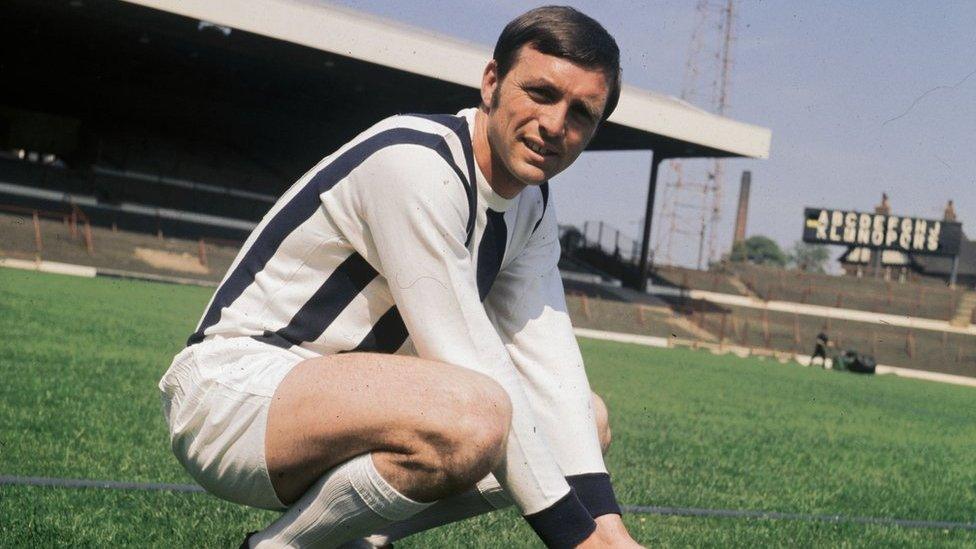Cardiff City footballer Keith Pontin's career 'could have killed him' inquest told
- Published

Keith Pontin played for Cardiff City and Wales
The death of a former Welsh international footballer with dementia could be linked to his playing career, an inquest has heard.
Keith Pontin, 64, from Pontyclun in Rhondda Cynon Taf, played for Cardiff City from 1976 to 1983 and won two caps for Wales.
On Friday, a coroner adjourned the Pontypridd inquest until 3 May 2022.
The Football Association of Wales said it would "take note of any findings".
Graeme Hughes, senior coroner for South Wales Central heard Mr Pontin died at the Royal Glamorgan Hospital on 2 August last year.
He had been diagnosed with dementia in 2015, at the age of 59, after concern about his mental decline.
Mr Pontin's family believe his condition was linked to years of heading the ball and multiple concussions.
Mr Hughes told the inquest there is reason to suspect that "Mr Pontin's death may have been unnatural in that his death may have been caused or contributed to by his work in that during his earlier life, he was a professional footballer".
He added there is evidence to suggest "a causal or contributory link between his career in football and the development of his Alzheimer's disease and his cause of death as chronic traumatic encephalopathy".
Chronic traumatic encephalopathy is a progressive brain condition believed to be caused by repeated blows to the head and episodes of concussion. The symptoms affect the functioning of the brain and eventually lead to dementia, the NHS website states.
'A great husband, a great dad, a great laugh'

In an interview with BBC Wales in 2018, Mr Pontin's wife Janet said he was constantly heading the ball during his career.
She said her husband, who has two grown-up daughters, sustained a "number of concussions" while playing football.
Mrs Pontin described him as a "great husband, a great dad, a great laugh".
By the age of 61, Mr Pontin, who made almost 200 appearances for the Bluebirds in the '70s and '80s, had given up work, stopped driving and struggled to keep up with conversations.
Following his death, Mrs Pontin said the family had made the "difficult decision" to allow his brain to be donated for medical testing to "make sure Keith didn't die in vain".
"His life was taken from us early, we lost him bit by bit and to see the deterioration in someone that was so fit and health was heart-breaking," she said.
She added she believes "the sport he loved eventually killed him".
Mr Hughes told the inquest in Pontypridd that there is some evidence in the medical investigations so far that would "suggest a causal link between his career in football and in the development of his Alzheimer's disease and CTE".
The full inquest is expected to hear evidence from consultant neuropathologist Dr Willie Stewart, who has examined samples of Mr Pontin's brain.
Dr Stewart led the research into brain injuries in 2019 that showed former professional footballers are three-and-a-half times more likely to die of dementia than people of the same age range in the general population.
The study, commissioned and jointly funded by the Professional Footballers Association (PFA) and the Football Association (FA), began after claims that former West Bromwich Albion striker Jeff Astle died because of repeated head trauma.
Since its publication, the FA has made changes to the way the game is played in England with children aged 11 and under no longer taught to head the ball during training, and limits on how much heading older children should do.
It says it has led "the way in ground-breaking research into the links with football and we have a clear and unwavering commitment, both financially and with resource, to support objective, robust and thorough research going forward".
- Attribution
- Published2 August 2020

- Published30 May 2018

- Published2 May 2019

- Published24 May 2018
